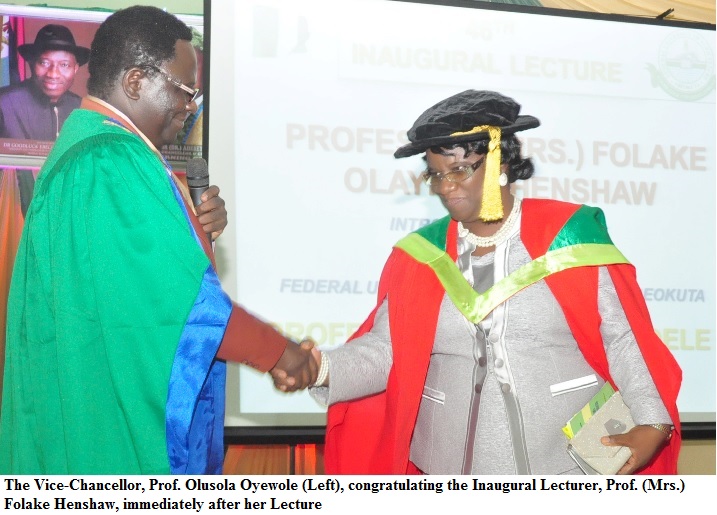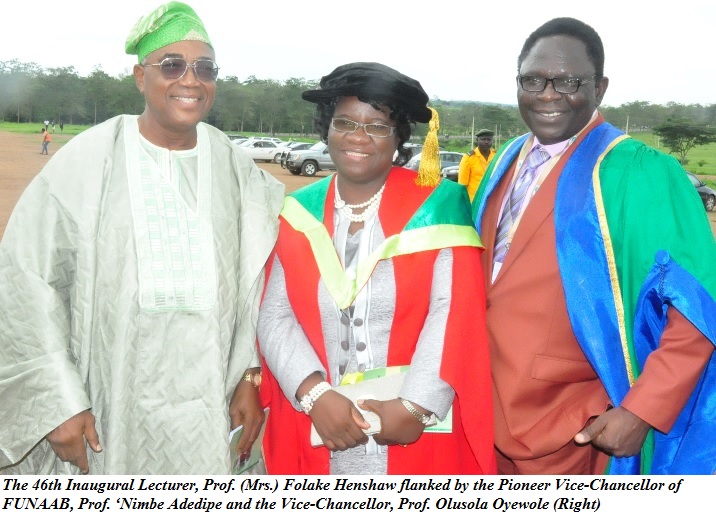The 46th Inaugural Lecturer of the Federal University of Agriculture, Abeokuta (FUNAAB),(Mrs.) Folake Henshaw has identified Post-Harvest Losses as the major contributing factor to global food insecurity. Delivering the lecture titled, Food Processing for Profit: Panacea for Post Harvest Losses, the Inaugural Lecturer, who is also the Dean, College of Food Science and Human Ecology (COLFHEC) and Chairperson, Committee of Deans and Directors of the University, noted that concerted efforts by the nation at increasing agricultural productivity required equal provision and effort at ensuring that what was produced get consumed and utilized.
According to her, a large proportion never get to the consumption stage in developing countries as a result of ineffective or inappropriate processing technologies, poor or non-existent infrastructure, poor post-harvest handling and lack of efficient value-addition chain. The Professor of Food Technology advocated for effective food processing, which is the application of scientific principles to preservation and transformation of food materials into affordable, safe products and by-products.
She defined food security as the availability of enough food, which is affordable and accessible at all times, for people to maintain an active and healthy life but that comtemporary realities had shown that food insecurity was still a global challenge. The University don disclosed that the Food and Agricultural Organisation (FAO) had in 2013, gave an estimate of 842 million people in the world that do not have enough to eat and go to bed hungry each night, out of which one-third of this number was found in Africa, adding that hungry man is an angry man. She said the anger of 842 million hungry people could constitute a huge threat to global peace and security, as she recommended the need to promote expanded utilization of the country’s food raw materials through the establishment of Community-Value Addition Chain which would eventually lead to the setting up of several Small and Medium Enterprises in food processing with the attendant gains of job creation, reduction in rural-urban migration, improved incomes and better livelihoods in many communities.
Professor (Mrs.) Henshaw, a product of the University of Ife now Obafemi Awolowo University; the University of Strathclyde, Scotland and the University of Ibadan, called for the launch of a Post-harvest Technology Transformation Agenda as an essential compliment to the government’s Agricultural Transformation Agenda, stating that with an efficient Post-Harvest System and improvement of existing infrastructure such as road, transportation and electricity that would make Nigeria to be able to feed herself and have surplus to sell to the world and become a net exporter of food.
The Inaugural Lecturer re-iterated the need for better funding of Food Research Agenda, maintaining that a well-articulated and funded research agenda would deliver the necessary capacities for knowledge-based development having Universities and research institutes designated as centres of excellence in food processing and product development to provide technical support on improved processing methods, food safety and quality including traceability. She also called for a change in the food habit and choices so as to ensure sustainable food security and economic growth, adding that a nation must love to eat what it grows or grow what it loves to eat.
The CODAD Chairman and Dean of COLFHEC concluded that though Nigeria was the largest importer of food in the world, in spite of a high capacity for agricultural productivity, noted that there was need for transformation of the post-harvest technology through the processing and preservation of food commodities as this would bring about viable strategy in ensuring sustainable livelihood and food secured populations. It was “not enough to merely increase agricultural production, equal provisions and efforts are required to ensure that what is produced get consumed and utilized. In order to guarantee sustainable food security, therefore, post-harvest losses must be attacked by developing an integral post-harvest system that incorporates processing and preservation. This will lead not only to enhanced incomes and profit for producers but also to better accessibility and affordability, accruing as profit for consumers”, she stated.
Speaking at the occasion, the Vice-Chancellor, Professor Olusola Oyewole, who is also the President, Association of African Universities (AAU), said the 46th Inaugural Lecturer was the fourth from her Department, second from COLFHEC and the tenth that he would preside over as the Vice-Chancellor of FUNAAB.
He said the Inaugural Lecturer was one of the longest serving academic staff in the University, a passionate advocate for gender equity and inclusiveness for the advancement of good quality of life. Professor Oyewole noted that with the dedication of thorough-bred academics like Professor (Mrs.) Henshaw, the University, which is fast attaining a world-class status, would be better positioned to produce graduates that would compete favourably with their counterparts from any part of the world.
